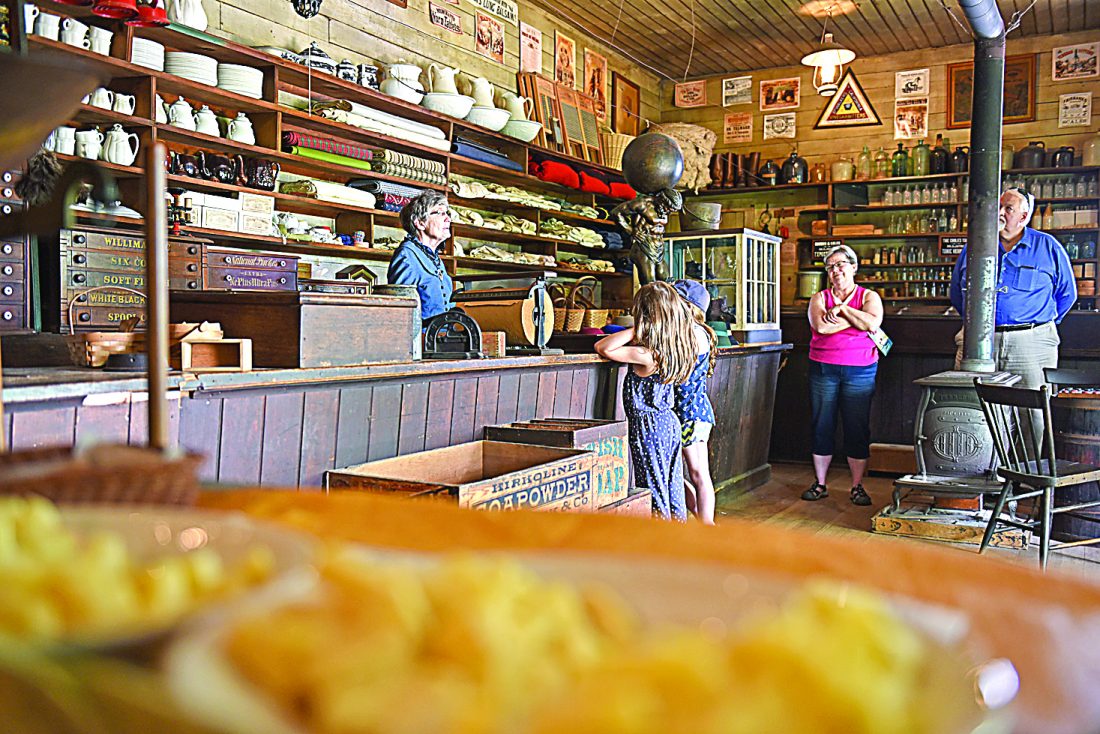Not for your delicate nostrils

Staff photo by Gage Cureton Harkin Store Site Manager Ruth Grewe leads a tour of the historic building during the store’s Sunday programming “Dairy Day With Samples” in West Newton. The Harkin Store celebrated the dairy industry and its history at the store with samples of Irish, Swiss and Spanish-style cheeses.
WEST NEWTON — No, that smell isn’t feet or used gym socks.
Walking through the front door of the historic Harkin Store Sunday, visitors may have smelled just that as the scent of Irish, Swiss and Spanish-style cheeses greeted their nostrils.
The cheeses were samples available to visitors for the Harkin Store’s Sunday programming that celebrated the dairy industry and the history of the historic site.
Because the founder of the store, Alexander Harkin, was a sheep farmer, Grewe said the program tried to aim for historic accuracy by providing sheep milk cheese samples as well as a caramel made from goat milk.
Grewe said cheese or other dairy products would have been a staple offered for sale or trade at the store during the 1800s. Milk would have been a rarer commodity to purchase because people of the era commonly churned it for butter.
“They actually didn’t drink a lot of milk,” Grewe said. “They made it as butters and cheeses and sour cream – different things like that.”
She said processing milk into butters or cheeses was considered as better usage for dairy because butter or cheese could be used more easily for cooking. Cheeses and butter could also be preserved much longer and even used to trade for other items at the Harkin Store.
“They didn’t really sell milk here,” Grewe said. “They had cheeses here and they would of probably had butter because at that time if you had extra butter you could bring it in and get money for it so you could purchase something you needed in the store.”
During the 1800s, many people usually owned a single cow. Large creameries or dairy operations didn’t exist.
Grewe said the cows of that time typically produced 21 quarts of milk a week compared to today’s cows that produce an average of 11 quarts in a single day.
“It’s because of the different food intake and the different processing that they have learned to do,” she said. “It’s also because of improved cows.”
The amount of milk the cows of old produced during the 1800s would have been a good amount for a family to survive on.
“Back then that would have made enough butter and different things for their food making and they probably didn’t drink as much milk because of that,” Grewe said. “I think more important than the milk was the product they could make from that cream and milk.”
Cheese samples at the Harkin Store were produced by Kerry Gold, Lustenberger 1862 — a Swiss cheesemaker company — and Manchego. Goat milk caramels were made by Canter Vine Dairy Goats in Gibbon.
The Harkin Store is open 10 a.m. to 4 p.m. Friday through Sunday. Admission is $6 for adults, $5 for seniors (65 or older) and college students, veterans, or active military, and $4 for children ages five to 17. Children ages four or younger or Minnesota Historical Society members are free.
The store has special programming most Sundays from May to October. Sunday May 19 the store will feature 1870s Minnesota riverboats and trade in West Newton.
Gage Cureton can be emailed at gcureton@nujournal.com.





